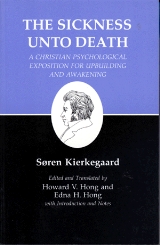
in 1849 under the pseudonym
Anti-Climacus. A work of Christian existentialism
, the book is about Kierkegaard's concept of despair, which he equates with the Christian
concept of sin
, particularly original sin
.
Anti-climacus introduces the book with a reference to Gospel of John
11.4: "This sickness is not unto death." This quotation comes from the story of Lazarus
, in which Jesus
raises a man from the dead.
Man is spirit. But what is spirit? Spirit is the self. But what is the self? The self is a relation which relates itself to its own self...
![]()
Is despair an excellence or a defect? Regarded in a purely dialectical way it is both. ... If only the abstract idea of despair is considered, without any thought of someone in despair, it must be regarded as a surpassing excellence. The possibility of this sickness is man's superiority over the animal, and this superiority distinguishes him in quite another way than does his erect walk, for it indicates infinite erectness or sublimity, that he is spirit.
![]()
A despairing man is in despair over something. So it seems for an instant, but only for an instant; that same instant the true despair manifests itself, or despair manifests itself in its true character. For in the fact that he despaired of something, he really despaired of himself, and now would be rid of himself.
![]()
Thus when the ambitious man whose slogan was "Either Caesar or nothing", and he does not become Caesar, he is in despairs over it. But this signifies something else, namely, that precisely because he did not become Caesar he now cannot bear to be himself. Consequently he is not in despair over the fact that he did not become Caesar, but he is in despair over himself for the fact that he did not become Caesar.![]()
This view will doubtless seem to many a paradox, an exaggeration, and a gloomy and depressing view at that. Yet it is nothing of the sort. It is not gloomy; on the contrary, it seeks to throw light upon a subject which ordinarily is left in obscurity. It is not depressing; on the contrary it is uplifting, since it views every man in the aspect of the highest demand made upon him, that he be spirit.
![]()
Eternity asks you and every individual in these millions and millions only one thing: whether you have lived in despair or not, whether you have despaired in such a way that you did not realize that you were in despair, or in such a way that you covertly carried this sickness inside of you as your gnawing secret... or in such a way that you, a terror to others, raged in despair.
![]()
Ah, so much is said about human want and misery -- I seek to understand it, I have also had some acquaintance with it at close range; so much is said about wasted lives...![]()
The greatest danger, that of losing one's own self, may pass off as quietly as if it were nothing; every other loss, that of an arm, a leg, five dollars, a wife etc., is sure to be noticed.
![]()

